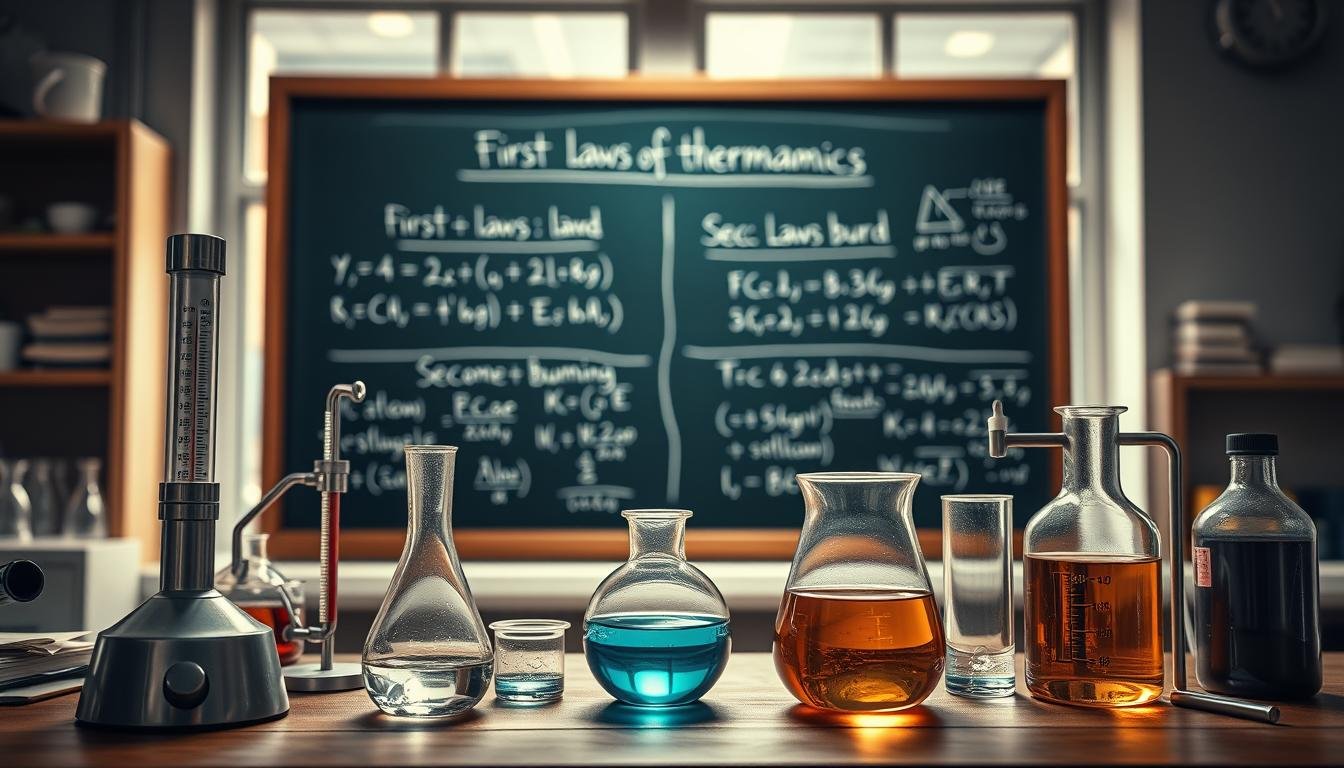Exploring thermodynamics, I see it as key to physics. It deals with energy, heat, and work. It lays the foundation for science and engineering by setting energy rules.
Understanding thermodynamics helps in making better engines and grasping nature. It’s also important for new ideas and saving energy. Entropy, in particular, helps us see how energy moves and its effects.
Introduction to Thermodynamics:
Exploring thermodynamics, I find a rich history filled with groundbreaking discoveries. Sadi Carnot’s work on heat engines in the early 19th century was a major milestone. His efforts laid the groundwork for thermodynamics, influencing many scientific fields.
Thermodynamics focuses on large-scale systems and their energy exchanges. This focus is key to understanding how energy moves and changes. Knowing these basics is essential for grasping the more complex aspects of thermodynamics.
The Laws of Thermodynamics:
The first law of thermodynamics says energy can’t just appear or disappear. It changes from one form to another. This rule helps us understand how things like engines and refrigerators work. They use energy to do work, but the total energy stays the same.
The second law of thermodynamics talks about entropy, or disorder. It shows that energy spreads out unless stopped. This is why things like heat always move from hot to cold.
The third law of thermodynamics deals with absolute zero. It says that as things get closer to absolute zero, their disorder gets as small as it can. This law is important for understanding how materials behave and how efficient systems can be at very low temperatures.
Key Concepts in Thermodynamics:
In my study of thermodynamics, I’ve found some key ideas. Enthalpy is one, showing a system’s total heat. It’s very important for studying chemical reactions where heat is involved.
The Gibbs free energy is another big idea. It tells us if a reaction will happen under certain conditions. By looking at Gibbs free energy, I can see if a reaction is likely to occur.
Thermodynamic cycles are also important. The Carnot and Rankine cycles show how energy moves from heat to work. These cycles help us see how efficient power and cooling systems are.
Exploring these concepts helps me understand thermodynamics better. Each idea helps me see how energy moves in physical systems.
Applications of Thermodynamics:
Thermodynamics is not just a theory. It affects many areas like engineering, chemistry, and biology. In engineering, thermodynamics helps design better engines and systems. This is key for making energy more efficient and sustainable.
In chemistry, thermodynamics is vital for understanding reactions. It helps make chemical processes more effective. This leads to better energy production.
Thermodynamics also plays a big role in biology. It helps us understand how living things use energy. This knowledge is important for studying how energy is used in living organisms.
Conclusion:
In this summary of thermodynamics, I’ve looked at its basic rules and laws. These rules help us understand energy and how it changes. Thermodynamics is key in many fields, like power and car design, because it helps us use energy better.
Thermodynamics also plays a big role in today’s tech, from coolers to new materials. It helps make systems more efficient and less wasteful. The future of thermodynamics looks good, with work on green energy and better ways to manage heat.
Knowing thermodynamics is important for science and engineering folks. I hope to get people excited about this field. As we work towards a greener future, thermodynamics will help us create new tech and improve what we already have.
